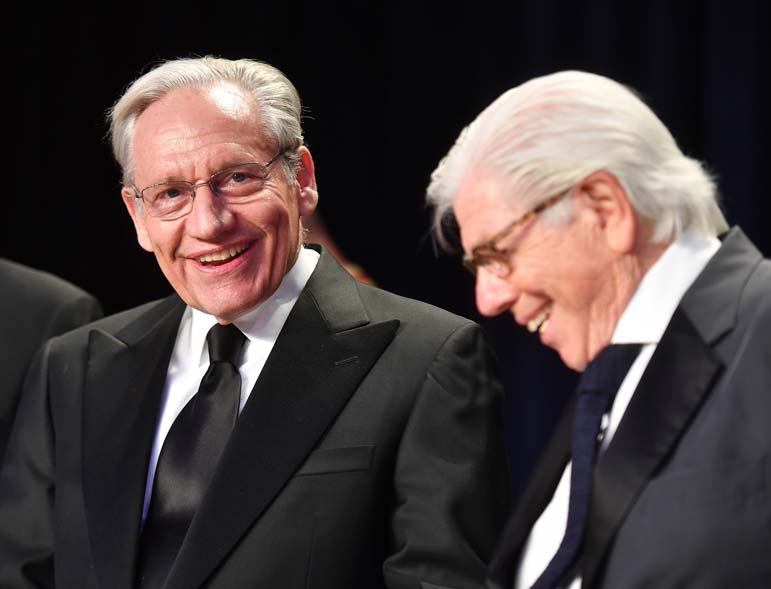 Bob Woodward, left, and Carl Bernstein chat at the White House Correspondents Dinner 2017. Washington Post photo by Marvin Joseph
Bob Woodward, left, and Carl Bernstein chat at the White House Correspondents Dinner 2017. Washington Post photo by Marvin Joseph
There was a broken heart for every wine glass and beer bottle at the Washington Hilton on Saturday night, where the White House Correspondents Association dined at their slimmed-down annual imitation of Hollywood glitz, grandeur and glamour.
The reporters, editors, pundits and wise men and women, sitting stiffly in their rented tuxedos, with the ladies in expensively gowned splendor, all felt unloved, reviled and disrespected, suspected by millions to be peddlers of fake news. The correspondents even put out a red carpet at the door where the limousines arrive, but it still felt a Scotch-and-water or two short of an Oscars night.
The president, who made a point of being three hours and a hundred miles away in Pennsylvania, was the most derided man not in the room. The evening's not-so-great entertainer, hired to make everybody laugh, complained that the president was campaigning in Pennsylvania "because he can't take a joke." Celebrities stayed away, too.
Several comedians whose names wouldn't have escaped anyone turned down the gig. The streets in the fashionable nearby Kalorama neighborhood, usually clogged with the limousines of the rich and famous en route to hot-ticket "after parties," were deserted this year. Nobody was up to staying up.
The New York Times, which no longer participates in the annual dinner, sent a working stiff to observe the heartbreaking state of affairs, and reported mournfully: "Even as Mr. Trump heckled the proceedings in real time - joking at a Pennsylvania rally about reporters 'consoling each other in a Washington ballroom' - attendees [sic] said the often-frivolous dinner felt oddly profound. Part pep rally, part therapy session, the event became a moment of catharsis for a political press corps that has faced months of unrelenting strain.
"Loud cheers and a palpable sense of defiance broke out when the president of the correspondents association, Jeff Mason of Reuters, declared with sermonlike ferocity, 'we are not fake news. We are not failing news organizations. And we are not the enemy of the American people.' It was the longest ovation of the night."
Well, bless their hearts. No one had ever before accused them of writing or saying something profound, unrelenting strain or not. E.J. Dionne of The Washington Post tried to strike a cheerful note, telling a reporter that just having Bob Woodward and Carl Bernstein on stage sends the message that journalists can, under the right circumstances, topple a presidency.
Woodward and Bernstein were indeed on stage, and had the message that could be taken to heart (but probably won't be), that it's not a reporter's job to topple a presidency, no matter how much fun to speculate on whom Hollywood might cast to portray him as the new Woodward or Bernstein. "Shortly after Richard Nixon resigned the presidency," Mr. Bernstein recalled, "Bob and I were asked a long question about reporting. We answered with a short phrase that we've used many times since to describe our reporting on Watergate and its purpose and methodology. We called it 'the best obtainable version of the truth.' Richard Nixon tried to make the conduct of the press the issue in Watergate instead of the conduct of the president and his men. We tried to avoid the noise and let the reporting speak."
That's a quaint and old-fashioned formula in the new century where making noise is the name of the game, and reporting is not nearly as much fun as manufacturing a rant or rave. "I know of no important story that I've worked on in a half-century of reporting," Mr. Bernstein told the dinner, "that ended up where I thought it would go when I started on it."
Bob Woodward agreed. "The indispensable centrality of fact-based reporting," he said, "is careful, scrupulous listening and an open mind. President Nixon once said, 'the problem with journalists is that they look in the mirror when they should be looking out the window.' That is certainly one thing that Nixon said that Carl and I agree with.
"Whatever the climate, whether the media is revered or reviled, we should and must persist, and I believe we will. We also need to face the reality that polling numbers show that most Americans disapprove of and distrust the media. This is no time for self-satisfaction or smugness." Applause for that, not so much.
An earlier generation of journalists (as they insist on calling themselves) would not have known what to make of a pity party. Being reviled for making politicians squirm was part of the job. "Keep yourself out of the story," an editor told me once upon a long time ago. "Nobody cares how difficult it was to get the story. Plumbers don't expect love for wading through other people's [waste], and neither should you." Right on.
Comment by clicking here.
JWR contributor Wesley Pruden is editor emeritus of The Washington Times.


 Contact The Editor
Contact The Editor
 Articles By This Author
Articles By This Author